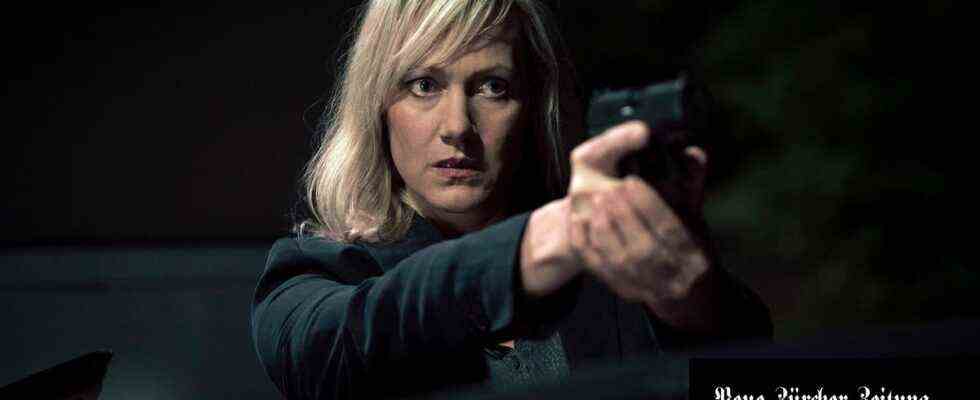It was a moment of shock that WDR came up with for the latest Dortmund “Tatort” episode: the case seems to have been solved when chief inspector Martina Bönisch was shot at the end.
The Toughe: Chief Inspector Martina Bönisch (Anna Schudt).
“Tatort” actors come and go, and writing such a departure into an episode is a challenge for screenwriters. That “Tatort” commissioners are killed “in action” like now in the Dortmund episode “Love me!” Martina Bönisch has hardly ever existed before. One still remembers the Hamburg commissioner Cenk Batu (Mehmet Kurtulus), who died brutally in the end in a hail of bullets (“The Ballad of Cenk and Valerie”, 2012).
Actors who leave the Sunday crime series are usually announced well in advance (such as recently Charly Hübner’s farewell to the Rostock police call). It is a first for the audience to learn that an actress has left the film as a result of the irreversible events in the film.
The ending was kept secret
The decision for this, let’s say: the greatest possible drama fits the Dortmund “crime scene”, where you like to give your all when it comes to storytelling. The fact that the departure of Anna Schudt, who had been part of the four-man Dortmund team since the first episode “Alter Ego”, was kept secret until the end and Bönisch surprisingly lost her life in action, is a coup.
Much of what is said or shown in this film seems to have a deeper meaning in hindsight. She reminds her of her mother, says the twin sister of the serial killer, Julia Ihle (Marlina Mitterhofer), once to Martina Bönisch. In retrospect, the sentence seems outrageous, at least it should have been a warning to the investigators. Ihle, who runs a funeral home with her husband and apparently lives a normal life, will be the one who fires the fatal shot at Martina Bönisch and goes down in revenge with her brother.
Was it a sign of impending great love or a premonition when chief inspector Martina Bönisch (Anna Schudt) asked her boss (Jörg Hartmann): “Do you want to be cremated later?” Peter Faber, who terrorized the entire Dortmund team to the core with his longing for death for a long time, got on our nerves and yet became a favorite on Sunday evening together with the team, answers: “I often wanted to die, but I have that I haven’t thought about it yet.”
A worthy farewell film
We have no power over our own deaths, and although the dead are so often defenselessly blessed in TV crime, the genre gives surprisingly little thought to it. The Dortmunders have always been the existentialists among the “crime scene” investigators, and the idyllic forest cemetery, where a corpse was found by chance that doesn’t belong there, opens up an echo chamber for a moment, which you can turn to at the end of this Films will sadly remember – in this comment by Martina Bönisch: «I would like it in a place like that. So peaceful here.”
With “Love me!”, after all, this “crime scene” commissioner and her wonderful actress, who delighted the audience for over ten years, have been given a cinematic, worthy, multi-layered end. It is the 21st case of the Dortmunder, who for ten years – and in competition with the Rostock “Polizeiruf” – have specialized in horizontal storytelling in Sunday crime. In Dortmund, too, and this is once again a good example, they have mastered the art of giving each character in the team their own story as a subtext, without ever losing sight of the big picture.
In this anniversary and at the same time farewell edition, Faber gains clarity about his affection for Martina Bönisch; something is happening here. Can Faber overcome his trauma through this love? While in the last episode an apparently accidental touch of the hands indicated the new development, this time Peter Faber dares more. Later there is another telling moment when Faber Bönisch looks on with jealous fascination as she moves around on dating platforms like a fish in water. Due to her resemblance to the victims, Bönisch is said to serve as a decoy for the killer.
absent mothers
The dead woman turns out to have been missing for a year, and while the investigation into this case is still beginning, another woman’s body is found at the same place. Both victims, long-haired and blond, were strangled, made up after death and dressed in a flowered, outdated dress. The detectives suspect a serial killer. And since both grave sites were reserved at the same funeral home under false names exactly one year apart, and the anniversary is approaching, a race against time begins for Peter Faber’s team.
In between, Jan Pawlak (Rick Okon) has to tell his daughter the truth about her mother, for better or for worse, if he doesn’t want to lose Rosa Herzog’s (Stefanie Reinsperger) solidarity as well. And with her, her mother (Rosa Enskat) suddenly appears, who disappeared when Rosa was twelve years old.
Mothers who abandon their children soon run through this film as a sad leitmotif. There is an image for the trauma: the strangely deserted scenery of an upcoming birthday with balloons and birthday cake appears repeatedly. Real or just as a dreamy, colorful arrangement of a doll’s house, this production seems like the murderous echo of the game that the investigators Bönisch and Faber like to play in order to track down the perpetrators. Here, however, he anticipates the staging in a ghostly beacon.

Martina Bönisch (Anna Schudt) and Peter Faber (Jörg Hartmann) come together in “Love me!” closer again.
What’s next in Dortmund?
This time the screenplay is again by Jürgen Werner, who invented the Dortmund team and has often tested how far you can go with them. «Love me!», it can be a quiet request or a sick obsession – the film begins as a whodunit and develops into a horror thriller, although the lust for the monstrous never gets the upper hand. What is it that makes some overcome their childhood trauma and others perish from it? Everything boils down to escalation here.
You won’t recover from the end of this film anytime soon. This sudden, violent death of Martina Bönisch is not only a shocking moment, however, because it came without warning, but also because the Dortmund edition represents a special type of “crime scene”. Wherever you rely on a horizontal narrative style, the human interaction – here especially between Peter Faber and Martina Bönisch – is essential. The inspector, played by Anna Schudt with a strong character, made the central character of Faber what he is in many ways: by defying him and giving the team support when he freaked out again.
The fact that a lot of things are far-sighted and thought out with care in Dortmund is particularly striking here. It seems particularly tragic that Martina Bönisch of all people, who fought for custody of her two sons for so long, is now the victim of those whose lives have been permanently damaged due to a lack of motherly love. With the death of Bönisch, with questions about guilt and loneliness, a circle closes.
The Dortmund team, consisting of Peter Faber (Jörg Hartmann), Jan Pawlak (Rick Okon) and Rosa Herzog (Stefanie Reinsperger), will initially be three. “Martina Bönisch cannot be replaced 1:1,” says a WDR press release. In Dortmund, where the episodes are told in series, the question naturally arises as to how the loss of Martina Bönisch will affect the team, especially Faber. That should be exciting again.
“Tatort” Dortmund: “Love me!”, on Sunday, February 20, at 8:05 p.m. on SRF 1 and at 8:15 p.m. on ARD.

